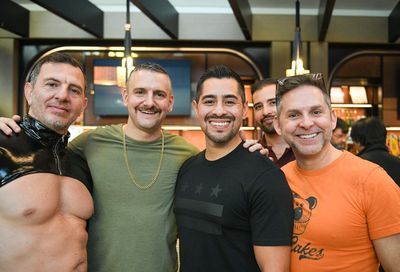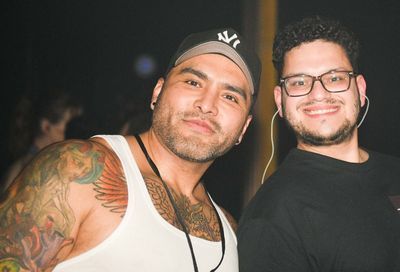‘Mexodus’ is a Thrilling Feat of Theater (Review)
A dynamic duo of performers bridge hip-hop and history to drop indelible knowledge in Mosaic's rousing rap musical "Mexodus."

Bringing beats, rhymes, and life to an untaught chapter of American history, Brian Quijada and Nygel D. Robinson form a formidable double act in their world-premiere musical Mexodus, currently at Mosaic Theater.
The pair created and perform the show, which traces the journey of an enslaved Black man in 1850s Texas who escapes to freedom along the Underground Railroad that moved folks across the southern border to Mexico.
He’s a field hand named Henry — portrayed by Robinson — and he becomes a vessel for envisioning the thousands of enslaved people who, instead of venturing north, fled south to Mexico, where slavery had been abolished since 1829.
Robinson and Quijada put Henry and his kindred souls back on the map through taut drama and storytelling, including professing that, before developing Mexodus, they knew next to nothing of this history. Probably, many of us didn’t know much about it until Alice M. Baumgartner’s award-winning 2020 book South to Freedom shone a light on forgotten stories of the Underground Railroad to Mexico.
To their compelling account, the Mexodus maestros add a head-bobbing hip-hop score they seemingly come up with on the fly. Director David Mendizábal has shaped the evening into an effervescent adventure, as the duo builds each song from scratch, creating loops of bass lines, beats, and melodies.
With Quijada looping a vocal phrase on the mike, and Robinson adding a riff on bass, or Quijada noodling on the guitar, while Robinson adds a Gil Scott-Heron-style hook on the keys, they paint layer after layer until a groove gels. Then, one or the other will take the mike for the lead vocal, rapping, or in Robinson’s case, delivering smooth-as-honey singing, over a bed of hip-hop or blues.
Controlling their loop cues with floor-mounted pedals and switches, each commands the stage with their own distinct appeal, and the assistance of sound engineer Simon Briggs on the mixing table. The pair’s musical prowess is impressive, even if their rap flow sometimes settles into a Lin-Manuel Miranda cadence that seems almost inevitable post-Hamilton.
But the score rocks, whether setting a scene with a knee-bouncing beat or relaying harsh truths about slavery. The songs of Henry speak to his strength and perseverance amid the dehumanizing conditions of his life. Born enslaved in Kentucky, he was sold at eight-years old to a Texan who owned a cotton plantation near the Rio Grande.
“Take these shackles off my hands,” he pleads. Chasing freedom is a life or death proposition, and Henry chooses his life, after taking the life of a white man. His crime sends him on the run, where, eventually, he crosses paths with Carlos, an ex-soldier for the Mexican Army, who’s also lost his whole family.
But the two strangers’ mutual understanding flows deeper than bonding over the shared experience of loss. In a powerful moment for Quijada, Carlos sings of finding a Black boy’s corpse floating in the river, a somber picture of the desperate urge to be free. Carlos is inspired to open his heart. Henry aspires, for himself, and, he might hope, for the Henry’s down the line.
Pointedly, the show ponders, “What are you doing with the days your ancestors earned you?” And, innately, Robinson and Quijada’s collaboration reflects the history of cross-cultural unity between peoples on either side of the Rio Grande that’s also beautifully portrayed via Henry and Carlos.
Costumed by Mendizábal to look like hip-hop bohemians riffing up their opus, as well as the 19th-century characters they’re playing, the co-stars slide easily between roles as historical players and present-day bards.
Trading verses inside scenic designer Riw Rakkulchon’s back-country barn filled with musical instruments, and cotton limbs poking through the slats, they epitomize a pivotal line spoken by Carlos, “Todos estamos juntos en estos” — we’re all in this together.
Mexodus (★★★★★) runs through June 15 at the Atlas Performing Arts Center, 1333 H St. NE. Tickets are $42 to $70, with discount options for each performance. Call 202-399-7993, ext. 2 or visit www.mosaictheater.org.
Support Metro Weekly’s Journalism
These are challenging times for news organizations. And yet it’s crucial we stay active and provide vital resources and information to both our local readers and the world. So won’t you please take a moment and consider supporting Metro Weekly with a membership? For as little as $5 a month, you can help ensure Metro Weekly magazine and MetroWeekly.com remain free, viable resources as we provide the best, most diverse, culturally-resonant LGBTQ coverage in both the D.C. region and around the world. Memberships come with exclusive perks and discounts, your own personal digital delivery of each week’s magazine (and an archive), access to our Member's Lounge when it launches this fall, and exclusive members-only items like Metro Weekly Membership Mugs and Tote Bags! Check out all our membership levels here and please join us today!
























You must be logged in to post a comment.